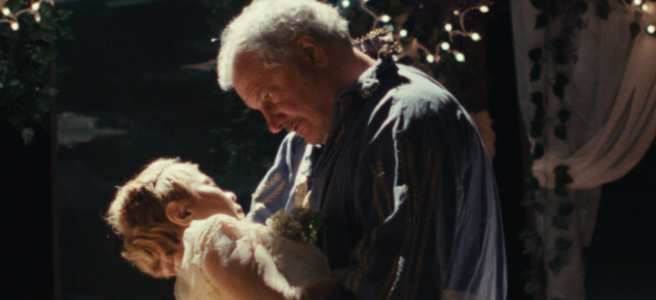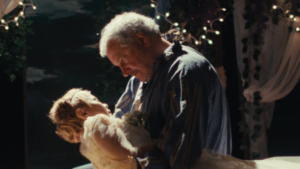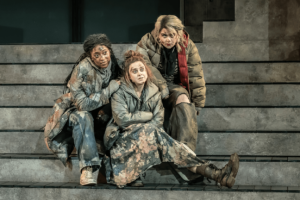Let me get this out of the way first – we need more movies like Ghostlight. It’s neither “movie version of Shakespeare” nor “modern adaptation.” It’s a regular movie, with a plot of its own, that happens to use Shakespeare as a backdrop to tell its story. I will always watch movies like this.
I only heard about this movie about a week or two ago, so I’m excited that I got to see it so quickly. All I knew was that it’s a family drama, where the actors who play the family are in fact a real-life family, and that a production of Romeo and Juliet is central to the plot. I’m in.
Something’s wrong with this family. Dan, the father, walks through his construction worker job like a ghost. His daughter, Daisy, has run out of chances at school and now teeters on the edge of expulsion. And Sharon, the mom, tries valiantly to keep the family together when it’s obviously falling apart. Something’s happened to these people. There’s talk of a lawsuit that none of them are sure they are ready for. They scream at each other for seemingly random reasons at the drop of a hat.
Through a series of fortunate(?) events, Dan finds himself unwillingly volunteered to help out the community theatre group that’s been practicing in the abandoned movie theatre across from the street he’s been jackhammering. They’re doing Romeo and Juliet and need a Lord Capulet, though as the story progresses and we learn the characters, roles ultimately shift.
From there, you probably know how it goes. This is a story about the healing, bonding, and cathartic power of not just Shakespeare but theatre in general. There are many scenes of silly rehearsals as Dan loosens up around his new adopted family. Most of them behave as if they’ve never done Shakespeare, admitting freely that they don’t know what they’re talking about. Dan even asks his daughter if she knows the play (the daughter, on cue, recites the prologue that she had to memorize for AP English) and how it ends. If this had been a movie about learning to express your emotions through art, Shakespeare would have been replaced with oils or pastels. He’s just the medium.
It’s being praised in places as one of the year’s best movies, but I won’t go that far. It’s disjointed in its plot, with some loose ends that don’t get resolved. In a movie where the best acting is done when characters are screaming at each other, the scenes where they’re trying to be funny come up short. Some important details are held back, but as soon as a little bit is revealed you can begin to put the whole story together.
The Shakespeare’s not great. Too often the script is cut, so if like me you’re there whispering along with the lines you’ll be frustrated at all the random cuts. If you do see it, I thought that literally the best moment of Shakespeare was when the mom asks the dad to recite some for her. It was hesitant and awkward and beautiful because of how honest it was. He whispered after, “I won’t do it like that on stage,” and I said aloud, “No, do it exactly like that.”
Ultimately, it’s where the story does not play into expectations that it’s at its best precisely because of how honest and real it is, and that’s where it gets the praise. This is a small group of over 50-year-olds doing a play about teenage suicide. The audience, right along with the other characters in the movie, has to get past the shallow physical aspect to the essence of what theatre is all about. Peter Brook had a famous quote like, “When a man walks across a bare stage, and another man watches him, that is all that’s needed for theatre.” This is what I thought as our construction worker first walked into the theatre. I thought, “Whatever he does and however he does it, that’s the story I want to watch.”
Parts are frustrating. I’ve never been an actor, never done the silly rehearsing exercises (“red ball! RED BALL!”), but even I threw my hands up in the air when the director invited a new member into the group and said, “Pick any role you want.” I only later realized that one of the existing members was doing something of a Nick Bottom, trying to claim every role for himself, who got continually frustrated as they were taken from him. But come on, these people presumably auditioned (it says so in the dialogue). You don’t insult them by telling a newcomer they can have whatever role they want.
See this one if you can. It’s no triumph of Shakespearean acting, but that’s the whole point. It’s not about the quality of the performance, it’s about the humanity that anybody can bring to the task whether they’re actually any good at it by some objective standard.






